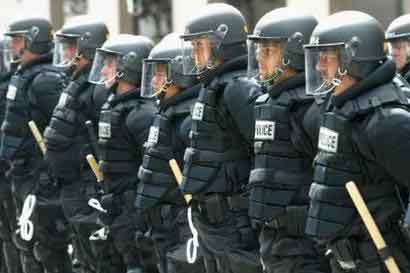It is ironic that prior to the Beslan assault the U.S. intelligence community heard noise about a potential terrorist threat. Their interpretation of that 'noise' was that Al Qaeda was preparing to disrupt the Republican convention. Such navel gazing resulted in this horrific massacre of school children. The noise was real, it just had nothing to do with the US. And everything to do with the old USSR.
 Some key facts about Basayev
Some key facts about Basayev
* Basayev was born in 1965 and brought up by the generation of Chechens who had just returned to their homeland after being exiled by dictator Josef Stalin to Kazakhstan and Siberia. He was a talented footballer who studied at an engineering institute in Moscow and at an Islamic institute in Istanbul.
* Basayev was a fierce fighter motivated by militant Islam. He listed South American revolutionary Che Guevara as his hero, but believed Russian civilians, including children, were legitimate targets in the fight for independence from Moscow. He once described himself as "a bad guy, a bandit, a terrorist."
He was less influenced by Che as he was the very model of Nechayev's amoral revolutionary; the nihlist. Which by the by is also the model for Al Qaeda. Regardless of their claims to Islam, as Basayev shows, they are amoral nihilists. Nechayev who?
Perhaps Nechayev's most controversial theorem was his amoral statement that "the ends justify the means." In his mind, the revolutionary cause was to succeed by whatever means necessary. Given the very real threat of extinction that western man faces, this once extreme idea might not be so extreme any longer:
For him, everything is moral which assists the triumph of revolution. Immoral and criminal is everything which stands in its way.
Racialism, Revolution, and the Radicalism of Sergei Nechayev ...
And with a certain irony it is Putin who is now the neo-Lenin in Russia that has to put up with the revived heritage of Nechayev as does the Military Industrial Dictarorship in the USA. If Basayev was a product of post Stalinist Russian liberalism, he became the Stalin of Chechnya, while Putin becomes the new Stalin of Russia.
Sergey Genadievich Nechayev was a man so feared by the Czar and the aristocrat, ruling classes, he became the Czar’s special prisoner. The Czar received weekly special reports on Nechayev’s prison activities.
Nechayev was born September 20, 1847. He died at age 35 in prison, on December 3, 1882 – from dropsy complicated by scurvy.
He was convicted for the murder of a fellow student, but his real crimes were political. He frightened the state because he claimed to head a secret society four million strong. In truth, it was a small group, maybe a few hundred, mainly of St. Petersburg students. The trial sentenced him to 20 years in Siberia. The Czar intervened and ordered him to be retained for the rest of his life. He was kept in Cell #1 of the notorious Alexis Ravelin of the Peter and Paul Fortress.
As a human being, he left much to be desired – he lied, cheated, blackmailed, murdered. Of course, he would defend his actions based on the principles laid out in the following document. Regardless his personal attributes, he rejected the authority of the state to his dismal end and, for that, gained legendary status in Russia.
The Narodnaya Volya (People’s Freedom) considered using its resources to free him rather than kill the Czar – an offer he rejected, saying the death of the Czar was more important. (And, indeed, on March 13, 1881, Czar Alexander II was assassinated whilst riding through the snowy streets of St. Petersburg.)
The Revolutionary Catechism by Sergey Nechayev 18691. The revolutionary is a doomed man. He has no personal interests, no business affairs, no emotions, no attachments, no property, and no name. Everything in him is wholly absorbed in the single thought and the single passion for revolution.
2. The revolutionary knows that in the very depths of his being, not only in words but also in deeds, he has broken all the bonds which tie him to the social order and the civilized world with all its laws, moralities, and customs, and with all its generally accepted conventions. He is their implacable enemy, and if he continues to live with them it is only in order to destroy them more speedily.
6. Tyrannical toward himself, he must be tyrannical toward others. All the gentle and enervating sentiments of kinship, love, friendship, gratitude, and even honor, must be suppressed in him and give place to the cold and single-minded passion for revolution. For him, there exists only one pleasure, on consolation, one reward, one satisfaction – the success of the revolution. Night and day he must have but one thought, one aim – merciless destruction. Striving cold-bloodedly and indefatigably toward this end, he must be prepared to destroy himself and to destroy with his own hands everything that stands in the path of the revolution.
9. It is superfluous to speak of solidarity among revolutionaries. The whole strength of revolutionary work lies in this. Comrades who possess the same revolutionary passion and understanding should, as much as possible, deliberate all important matters together and come to unanimous conclusions. When the plan is finally decided upon, then the revolutionary must rely solely on himself. In carrying out acts of destruction, each one should act alone, never running to another for advice and assistance, except when these are necessary for the furtherance of the plan.
10. All revolutionaries should have under them second- or third-degree revolutionaries – i.e., comrades who are not completely initiated. these should be regarded as part of the common revolutionary capital placed at his disposal. This capital should, of course, be spent as economically as possible in order to derive from it the greatest possible profit. The real revolutionary should regard himself as capital consecrated to the triumph of the revolution; however, he may not personally and alone dispose of that capital without the unanimous consent of the fully initiated comrades.
13. The revolutionary enters the world of the State, of the privileged classes, of the so-called civilization, and he lives in this world only for the purpose of bringing about its speedy and total destruction. He is not a revolutionary if he has any sympathy for this world. He should not hesitate to destroy any position, any place, or any man in this world. He must hate everyone and everything in it with an equal hatred. All the worse for him if he has any relations with parents, friends, or lovers; he is no longer a revolutionary if he is swayed by these relationships.
26. To weld the people into one single unconquerable and all-destructive force – this is our aim, our conspiracy, and our task.
THE DEATH OF Shamil Basayev, a Chechen rebel commander responsible for horrific terrorist acts, is being trumpeted by Russian President Vladimir Putin not merely as reprisal for Basayev's atrocities, but as a fatal blow to the Chechen independence movement.
All is the historical inheritence of the Bolsheviks. Those who would use State power to win a revolution are doomed to fail and to create their own dopplegangers like Stalin and Basayev. While they are amoral nihilists they are NOT revolutionaries.
Boris Souvarine
Stalin: A Critical Survery of Bolshevism
Translated by C.L.R. James
Chapter VI. The Civil war
The whole of the non-Bolshevik press abused and vilified the usurpers." Only the journals of the Right had been suspended, but the others felt their interests assailed by the attack on the freedom of the press. Articles Of Gorky, a former Left Bolshevik, give an idea of the general point of view, and sum up the average opinion held by the socialist revolutionary intelligentsia: "Lenin, Trotsky and their disciples are already intoxicated with the poison of power as is proved by their shameful attitude towards liberty of speech, personal freedom, and all the rights for which Democracy has fought." In the same Novaya Zhizn, in the pages of which he had defended the fugitive Lenin after the days of July, Gorky described the Bolsheviks as "blind fanatics, conscienceless adventurers," and Bolshevism as a "national disaster."
He denounced the "vanity of Lenin's promises ... the extent of his madness ... his anarchism on the Nechayev and Bakunin model," and his government as an "autocracy of savages." He expressed passionate indignation over their first steps in dictatorship. "Lenin and his acolytes," he said, "think they have licence to commit every crime." "How," he asked, "does Lenin's conduct with regard to freedom of speech differ from that of Stolypin, Plehve and other caricatures of humanity? Does not Lenin send to jail all those who do not think as he does, just as the Romanovs did?"
Friend of Lenin as he was, he wrote of him in these terms: "Lenin is not an all-powerful healer, but a cynical conjurer caring nothing for the honour or the life of the proletariat." Lenin, he adds, has all the dualities of a leader, "especially the amorality essential to the part, and the country gentleman's scorn for the life of the masses." The Leninists are no better, for the "working classes are for them what minerals are for the mineralogist." He clings to the comparison with Nechavev. "Vladimir Lenin," he says, "is introducing the socialist regime into Russia by Nechayev's methods—at full steam through mud. Lenin, Trotsky and all the others who accompany them to destruction in the slough of realism are evidently, like Nechayev, convinced that dishonour is the best way of persuading a Russian. .. ." He takes pleasure in likening Bolshevism to Tsarism: "by threats of starvation and massacre for all those who do not approve of the Lenin-Trotsky despotism, these leaders justify the despotic power against which the best elements is the country have so long been struggling."
In reply to the reproaches of certain partisans of the new regime Gorky said: "Novaya Zhizn has asserted and will continue to assert that the requisite conditions for the introduction of socialism are non-existent in our country, and that the Government at the Smolny Institute treats the Russian workman as if he were a log; it sets light to the logs to see if the flame of European revolution can be kindled on the Russian hearth." He fearlessly warns the workers on repeated occasions and in varying terms: "The Russian proletariat is being subjected to an experiment which it must pay for in blood, life, and, what is worse, in lasting disillusion with regard to the socialist ideal."
Find blog posts, photos, events and more off-site about:
Russia, Chechnya, Chechins, Basayev, Terrorists, Terrorism, Nechavey, Stalin, Lenin, Bolsheviks, Republican-Convention-2004, noise, Al-Qaeda, Bin-Laden, CIA


